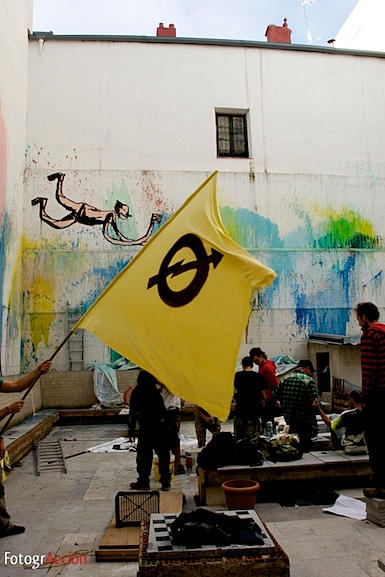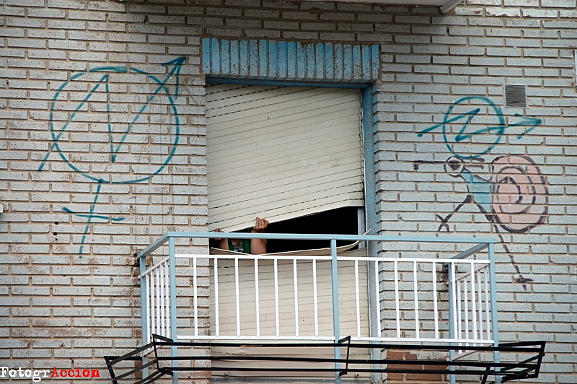Almudena Serpis

A big banner which hangs over the main door of a huge building announces that we have come to Squatted Social Centre La Quimera.
Its walls are painted with small childish creatures, and above them we can see security cameras and movement sensors, now obsolete. Located in the very centre of the busy capital of Spain, Madrid, this is one of the 15 squatted social centres in the city. These centres serve as important meeting points for members of the same neighborhood to strengthen social relationships, give mutual support, share views, problems and experiences and carry out any project of a social matter.
But these centres, unlike others, have its peculiarities. To start with, they are illegal, so they do not collaborate with the Estate or get support from it or from any other organisation of any sort. Instead the centres are run by a group of neighbors, with no leaders. Anyone can participate, whatever age, gender, social background and religious beliefs a person may have.
“We have chosen to run our own place with our own rules where respect is key”, says a member of Quimera. ‘For us nobody is essential but everyone is necessary. Once you have decided to join, the place is as yours at is is of anybody else, no matter how long you have been in the project’.
La Quimera social centre was named after a mythological being symbolising strength and hope. Inside there are four floors of activity. Amongst the permanent activities we can find a sign language seminar, Spanish classes for immigrants, flamenco, a home made cinema room, a library, theater lessons and a squatting support office. During weekends other groups and projects organise talks and seminars which cover different topics such as women’s rights, and working sessions such as learning how to fix the electricity.
All this is offered for free, as a way of empowering people through relations which not depend on capitalist logic. Whoever attends to the activities has to help out in the centre in whichever way they can from attending to meetings to helping out during events.
We want to create other ways of living by building together, exchanging and helping each other. We need money to survive but inside the social centre we try and replicate how we would like to live. What we need is people and what they are capable of doing and sharing”, says another member of Quimera.
How squatted social centres are run
Once a week there is a general meeting where everyone decides about the principles of the project, deciding which other projects to support, resolving any problems that may occur and talking about integration, ideology and politics. This meeting is also used to decide upon activities, and work that needs to be done. Then, the work is distributed amongst everyone.
“Most squatted social centres work in this manner. The regularity of meetings may vary but subjects are recurrent and follow the same line of thought and action in general. It is important to keep the movement united in some ways,” says a member of Madrid Squatting Office.
Also the group is divided in commissions. La Quimera has three: the communication group, which divulges the work and activities which will be carried out in the centre, the welcoming commission, which welcomes new projects and the economy commission which keeps count of the money and looks for new ways to finance the project. There are other working groups that form in certain moments when there are big activities to prepare.
“Everyone here has a chance to express their views and take part in decision-making. We speak about what we need and want without middle men. We then go and do it”, says a member of Quimera.
Legal issues
According to the Squatting Office, squatting is entering an abandoned place to make use of it. Contrary to what the media and the government claims, squatting does not involve entering into someone’s house when they are on holiday, but putting to use places that have long been abandoned, either to live in them or to use them as social centres and strengthen the community.
“Squatting is taking the matter into your own hands instead of waiting for anyone to do it for you”, says a member of Madrid’s squatting office.
In India for instance, we can find huge squatting communities such as Geeta Nagar in Mumbai, but the political and social essence is very different, distant from the theoretic political background present in other countries, which remains unknown for most of them. Meeting places are merely survival zones, but could serve as crucial spaces to discuss problems, help each other and get organised to improve living standards, in a similar way squatted social centres do in other places.
Despite this, most social centres end up getting evicted although the duration varies from a few months to several years. Madrid longest lasting squat La Casika has been running for 13 years.
“It is common that owners have done illegal acts as well, such as speculative construction works so they do not want to get involved with the law. That includes buildings owned by government”, says Carlos Castillo, a lawyer who specialises in criminal law.
In many other countries squatting is also illegal, but with the rampant economic crisis many families are left to live on the streets and take the step of squatting houses to live in despite it being criminalised. In 2012 in Spain alone, according to official figures, there were 115 evictions a day as banks demanded the houses that many families can’t afford to finish paying. This figure is now rising. Due to this a lot of people start getting familiar with squatting, as they consider it to be a legitimate act.
But squatting involves living on the edge as police forces try to carry out illegal evictions. Repression is everywhere as private property stands before any other interest. This is why social centres have created a support network to help each other, although evictions continue to take place.
“The problem is that a lot of people think of us as criminals. What we do inside these social centres never gets out on the news. It’s only negative information that gets out there”, says a member of Madrid’s squatting office.
World wide Context
There are many squatted centres in Europe and all over the world. Squatting became a political movement around 1960’s in Europe as the demand for housing rose due to the affluence of people coming from the countryside into the city. Places like England have a long squatting tradition. Since it’s origin it became a social movement fighting for people’s rights, social justice and ecology and has always been separate from the state. The organisation of the squatts has long included feminist views, self-sufficiency and anti-racism amongst their main ideals. It has adapted according to time and place to serve different purposes inside a similar political framework. According to Squatting Europe Kollective “in the end a squat is what squatters make it to be”.
Squatted social centres have shown us what people are capable of doing if they come together despite social and state rejection. Both members of Quimera who spoke to us agree that “when there is good will, committment and mutual support, anything can happen”.
(writer is a spainish activist)


